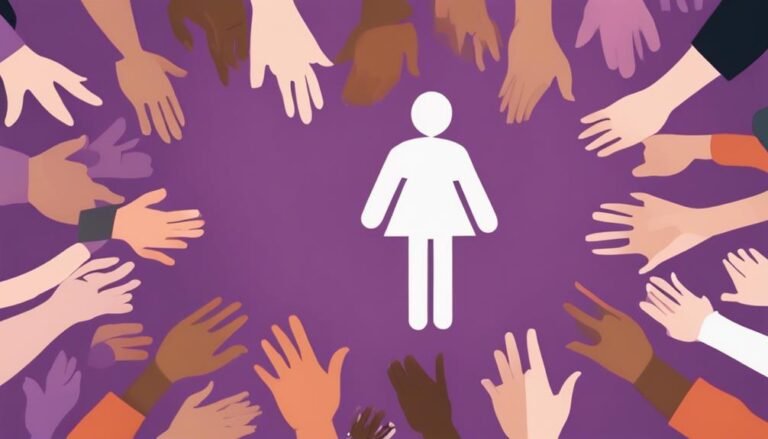When an abuser controls the story, survivors can feel trapped in a cycle of manipulation, where reality becomes distorted. This tactic often leads to self-doubt, isolation, and confusion, hindering healing and justice. Yet, empowering survivors to reclaim their narrative is vital in breaking free from the abuser’s grip. By seeking support, sharing truths, and documenting incidents, survivors can disrupt the abuser’s control and pave the way for healing and empowerment. Understanding the dynamics of abuse and manipulation is essential for survivors to challenge false narratives and reclaim their truth.
Key Takeaways
- Abusers manipulate reality to distort survivors’ experiences.
- Survivors may doubt their own truths due to gaslighting techniques.
- Reclaiming one’s narrative is crucial for healing and empowerment.
- Documenting incidents disrupts abusers’ control over the story.
- Educating on abuse dynamics equips survivors to challenge false narratives.
Abusers’ Manipulative Narrative Tactics
Manipulative narrative tactics employed by abusers aim to distort the truth, undermine survivors’ credibility, and perpetuate a cycle of control and manipulation. Gaslighting techniques are frequently used, causing survivors to question their reality and experiences. These tactics leave survivors feeling confused, isolated, and disempowered.
However, survivor empowerment is key in combating these insidious behaviors. By recognizing the signs of gaslighting and other manipulative strategies, survivors can reclaim their truth and regain control over their narrative. Seeking support, sharing their stories with trusted individuals, and documenting incidents can all be empowering steps towards breaking free from the grip of abusers’ lies.
Through survivor empowerment, individuals can begin to dismantle the harmful effects of narrative control and move towards healing and justice.
Impact of Narrative Control on Survivors
The pervasive influence of abusers’ narrative control greatly impacts survivors of abuse, shaping their experiences and challenging their sense of truth and agency.
Survivors often face psychological impacts, such as feelings of isolation, self-doubt, and disempowerment, as abusers manipulate the story to their advantage. This control over the narrative can hinder the healing process for survivors, making it difficult for them to reclaim their voices and seek justice.
However, survivor empowerment plays an essential role in combating the effects of narrative control. By supporting survivors in sharing their truths, seeking validation, and accessing resources, we can help them regain a sense of agency and move towards healing and recovery.
Empowering survivors to speak out and reclaim their narratives is vital in the journey towards healing from abuse.
The Power of Donations in Support
Donations play an essential role in providing support and assistance to survivors of domestic violence. Funding assistance through donations enables organizations to offer vital resources and services to those in need, empowering survivors on their journey towards healing and recovery. Contributions not only offer financial aid but also symbolize hope and solidarity for individuals facing domestic abuse.
By supporting these organizations, individuals can actively combat domestic violence and make a meaningful impact on survivors’ lives. The power of donations lies in its ability to provide tangible support, create awareness, and advocate for survivor empowerment.
Together, through funding assistance and community support, we can help survivors break free from the cycle of abuse and rebuild their lives with strength and resilience.
Strategies to Combat Abusers’ Lies
Empowering survivors to confront abusers’ deceitful narratives involves arming them with effective strategies to reclaim their truth and challenge the manipulative tactics employed against them. Building resilience in survivors is vital to combat the impact of abusers’ lies, helping them withstand the emotional turmoil and regain their sense of self-worth.
Seeking justice becomes a beacon of hope for survivors, motivating them to speak out and hold abusers accountable for their actions. By documenting incidents, confiding in trusted individuals, and seeking guidance, survivors can disrupt the abusers’ control over the narrative. These steps not only help survivors combat the lies but also pave the way for healing, empowerment, and eventual justice in the face of adversity.
Educating on Abuse Dynamics

Understanding the intricate dynamics of abuse is pivotal in empowering survivors to recognize and address harmful behaviors effectively.
Educating survivors on manipulation tactics utilized by abusers is essential for building awareness and resilience. By shedding light on how abusers control the narrative through lies and manipulation, survivors can gain insight into the tactics used against them.
Learning to identify these dynamics can help individuals navigate challenging situations, advocate for themselves, and seek support confidently. Education on abuse dynamics equips survivors with the knowledge to challenge false narratives, protect their truth, and break free from the cycle of manipulation.
Frequently Asked Questions
How Can Survivors Protect Themselves From Abusers’ Lies?
Recognizing tactics employed by abusers and seeking support are vital steps for survivors to protect themselves from lies. By staying informed, confiding in trusted individuals, and documenting incidents, survivors can combat manipulation and reclaim their narratives.
Are There Specific Signs to Look for in Abusers’ Manipulative Narratives?
Warning signs of abusers’ manipulative narratives include gaslighting techniques like denial and blame-shifting, portraying themselves as victims, and discrediting survivors. Psychological abuse manifests in controlling the narrative to maintain power and influence over survivors.
What Immediate Actions Can Survivors Take to Counter Narrative Control?
In times of distress, survivors can reclaim power through safety planning and self-care strategies. Building a network of support enhances empowerment, aiding in combating narrative control. Prioritizing well-being and seeking guidance can pave the way to healing.
How Do Donations Directly Help Survivors of Domestic Abuse?
Donations directly aid survivors of domestic abuse by providing essential support networks, counseling, financial assistance, and housing options. These contributions offer hope, resources, and empowerment to those in need, making a meaningful impact on survivors’ lives.
Can Survivors Seek Legal Recourse Against Abusers’ False Narratives?
Survivors can explore legal options to address abusers’ false narratives, including defamation lawsuits. Seeking justice through civil actions offers recourse against manipulative tactics. Empowering survivors to challenge lies and protect their truth is essential.
How Can I Regain Control of My Own Narrative After Abuse?
Regaining control of your own narrative when struggling to move on after abuse can be a difficult but empowering process. Surrounding yourself with a supportive network, seeking professional help, and finding healthy outlets for self-expression can help you reclaim your story and your sense of agency.
Conclusion
To sum up, the manipulation of narratives by abusers perpetuates a cycle of harm and silences survivors. By shedding light on these tactics and supporting victims, we can break the chains of control and empower those impacted by abuse.
Let us work together to challenge the lies, provide resources, and educate others on the dynamics of abuse. Only by standing united against these manipulative narratives can we create a safer and more supportive environment for all.







